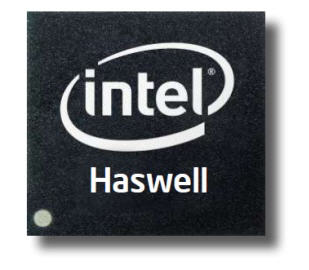Report: Upcoming Intel 9-Series Chipsets May Not Support Current Haswell CPUs
Due to differences in electrics, it appears that Intel might have compatibility issues between its upcoming 9-series chipsets and current 'Haswell' processors.

A report from VR-Zone indicates that the upcoming 'Broadwell' CPUs might have problems working on the current 8-series chipsets, as will the 9-chipset have trouble supporting the current 'Haswell' processors. This is particularly interesting because following Intel's tick-tock release cycle, according to the report, both of the platforms will share the LGA1150 socket. Earlier rumors and reports indicated that Intel's upcoming 'Broadwell' CPUs would feature a BGA socket, not an LGA socket.
The problems with backwards and forwards compatibility are being blamed on differences in the electrical connections, particularly with regard to power distribution throughout the chipset and motherboard.
While this rumor might be moderately concerning, Intel has planned to roll out a new series of refreshed 'Haswell' processors in the future. This is also a disturbance in the tick-tock release cycle. Expected changes include features that are catered more towards the feature set of the 9-series chipsets, with new features such as SATA express, and a very limited number of reports are indicating DDR4 support. From the report, we can also conclude that the 9-series chipset is catered to not only the 'Haswell' refresh CPUs or the 'Broadwell' CPUs, but rather to both.
Follow us @tomshardware, on Facebook and on Google+.
Get Tom's Hardware's best news and in-depth reviews, straight to your inbox.
Niels Broekhuijsen is a Contributing Writer for Tom's Hardware US. He reviews cases, water cooling and pc builds.
-
apache_lives its no problem, theres no such thing as an upgrade path these days anyhowReply
and why would i want a crappy old motherboard with a brand new cpu anyhow?
also a reason why Intel is so far ahead - newer designs = better efficency without being stuck with some out of date specifications and design
still i can see everyone complaining about this... -
yannigr apache_livesReply
i guess you are 15 years old taking money from dad and mom or some guy with full pockets, that's why you have no respect for your money. Someone who works hard on the other hand will think twice before paying every 6-12 months Intel for a new cpu AND motherboard. -
tului Reply11436741 said:apache_lives
i guess you are 15 years old taking money from dad and mom or some guy with full pockets, that's why you have no respect for your money. Someone who works hard on the other hand will think twice before paying every 6-12 months Intel for a new cpu AND motherboard.
I agree with you, I'd rather save the money and not be forced to upgrade. With a little planning, Intel could have made one socket last the past 3 chips. I mean the pin count went down! 1156 > 1155 > 1150. It's not like DDR4 or anything was introduced. I see it as a cash grab for investors in the face of declining PC sales.
Now if there is a substantial upgrade in performance or features to be had, sure, I'll gladly ante up for a board. ie when LGA2011 launched, I was all over it.
-
BoredErica Yannigr, I have a job and I work for my own money. Yet I agree with apache. Please stop assuming things about people's lives.Reply
So you're saying you are willing to buy another CPU for say, $220, $320 but buying another motherboard, that is the dealbreaker? Unless you're a pure CPU workhorse (in which case consider Ivy bridge E instead), upgrading is just excessive even if you just get the CPU. Having said that yes, two motherboard changes in a row is excessive, I prefer the whole Sandy to Ivy thing. -
rmpumper What the actual f*k? AMD does not talk anything about AM3+ or even new chipsets for Steamroller CPUs (don't care about 4 core Kaveri) or even if they will be releasing any CPUs other than Kaveri and now Intel are saying that their new 1050 is already dead while 2011 socked will be dead as well after Ivy-E release. Crap time for an upgrade.Reply -
yannigr dark_wizzieReply
Why pay $400 for a $220 cpu? Because that will be the cost WITH an quality new motherboard.
